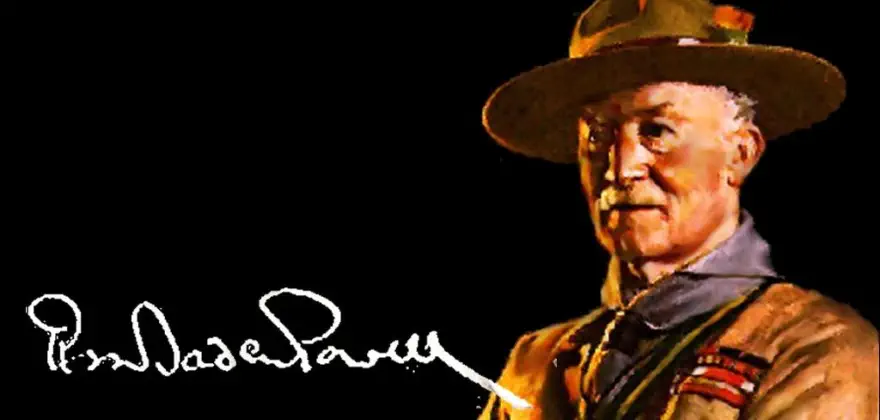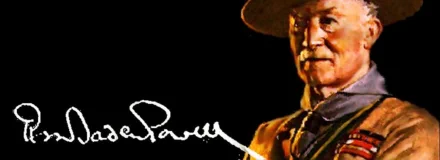



History
HISTORY OF SCOUTING
Scouting’s origins date back to the start of the Twentieth Century. They have survived the two World Wars, sweeping social events and the
challenges of other influences, to become stronger than ever. It does this by placing the needs of young people first -- in a program that can
adapt to change.
The Founder of Scouting, Lord Baden-Powell of Gilwell, was born in England in 1857. He lived a busy and adventurous life and, as a boy, spent
much of his spare time in open-air pursuits, hunting in the woods, and joining his brothers in expeditions by land and in their boats. Thus he
developed his powers of observation and resourcefulness, which helped him to acquire many useful skills.
His family was not wealthy, his father having died when Baden-Powell was young. His only chance for higher education was to obtain a
scholarship. This gave him entry into the Army. He was sent to India, where he served for many years. He tried out his ideas of training soldiers
in "scouting," and taught them how to develop experience in stalking and how to fend for themselves, as well as being observant of all signs
that would give them advantages as soldiers. He set down his ideas in the book, "Aids to Scouting," which was used as an army textbook for
many years.
After the famous siege of the South African town of Mafeking by the Boers, Baden-Powell, who was in charge of the defending force, was a hero.
He was given a great welcome on his return to England. Sir William Smith, leader of the Boys Brigade, encouraged him to set down his views on
how he would apply “scouting” to the training of boys. First, Baden-Powell conducted an experimental camp in 1907 on Brownsea Island off the
Dorset coast, where, with some twenty boys and suitable adult leaders, he taught the boys what he meant by Scouting. They lived in tents,
cooked their own food, and learned many valuable skills through games. The camp was a great success. Baden-Powell wrote of his experiences
in a book he called "Scouting for Boys." Published in January 1908 in fortnightly parts, it sold readily to the youth in England, who started to
carry out “scouting” as they read the book.
Although the year 1908 marks the official beginning of the Scout Movement, Scouting really commenced with the Brownsea Island Camp in
August 1907. Following this camp and the publication of the parts of the book, young boys in the community formed themselves into patrols of
six to eight, and then looked around for adult leaders who could help them. Soon there were thousands of Scouts all over the country, and
Baden-Powell had to set up an office to look after the new movement that had begun.
Within two years a rally at the Crystal Palace, London, drew together ten thousand young people. The Girl Guides Association was formed in
1910, after which came the Sea Scout Branch in the same year. The Wolf Cub section was formed in 1916, Rover Scouts in 1918, and the Special
Test (now "Extension or Handicapped") Department in 1926. The Group System (Cubs, Scouts and Rovers under the leadership of a Group
Scoutmaster/Leader) was established in 1927. Deep Sea Scouts followed in 1928, Air Scouts in 1941, and Senior Scouts in 1946 (now known as
Venturer Scouts). Joey Scouts, the latest section to be formed, began in 1990.
Meanwhile, in 1908 Scouting had also spread to Australia, New Zealand and India. Other countries followed shortly after. Chile, in 1909, was the
first country outside the then British Empire to start, followed closely by France, with the Scandinavian countries and the United States in 1910.
In 1937, two-and-a-half-million Scouts from nearly fifty countries were affiliated with the International Bureau. The Bureau was set up to
safeguard Scouting, and to prevent control drifting into the hands of the purely religious, political or military bodies. Wood Badge Training for
leaders commenced in 1919 at Gilwell Park, England, and has, over the years, become established as the method of Leader Training throughout
the Scouting World.
General Sir Robert Baden-Powell (as he became) was proclaimed World Chief Scout at the first Jamboree at Olympia in 1920. He was raised to
the peerage in 1929, and was awarded the Order of Merit in the Coronation Honours list in 1937. He travelled widely, encouraging Scouting in
every country he visited. He came to Australia three times: - in 1912, 1931, and to the first Australian Jamboree in 1934-35.
Meanwhile Scouting had become established as a most successful scheme for the training of boys. In many countries, including Australia, it
spread rapidly because it was what the young people wanted to do. Soon a headquarters was set up and leadership provided by recognized
members in the community. Many countries showered honours upon the Founder. He retired to Kenya, where he spent several happy years
with his family until his death on 8th January 1941.
He was described as "The Piper of Pax" (Peace), because of his tremendous contribution to youth and world peace.
There is now a World Scout Committee, which provides unity amongst the National Associations, with a World Bureau operating from Geneva
and independent national organizations in over two hundred and fifty (250) countries and territories. Scout membership is over twenty-five
million. Adapting to the general changes in society, Australian Scouting admitted females to its Venturer and Rover Sections in 1973, and to the
Cub Scout and Scout Sections in 1988. When the Joey Scout Section commenced in 1990, girls and boys were both admitted.
For each generation of Scouts, the challenge has remained the same: to make a better world and have some fun along the way





All rights Reserved © Southern Highlands Scouts 2025









